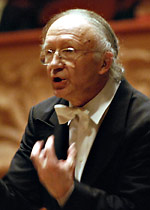Heinz Holliger Last updated November 19, 2025 Swiss composer, oboist, and conductor (born 1939)
Heinz Holliger
Born 21 May 1939 (1939-05-21 ) Education Conservatory of Bern Occupation(s) Composer, oboist, and conductor
Heinz Robert Holliger (born 21 May 1939) is a Swiss composer, virtuoso oboist , [ 1] and conductor. Celebrated for his versatility and technique, Holliger is among the most prominent oboists of his generation. [ 1] His repertoire includes Baroque and Classical pieces, but he has regularly engaged in lesser known pieces of Romantic music , as well as his own compositions. [ 1] He often performed contemporary works with his wife, the harpist Ursula Holliger . Many composers have written works for him, including Messiaen , Berio , Carter , Henze , Krenek , Lutosławski , Martin , Penderecki , Stockhausen and Yun . A noted composer himself, Holliger has written works such as the opera Schneewittchen (1998).
Biography Holliger was born in Langenthal , Switzerland. [ 2] An oboist since age eleven, [ 3] he studied at the conservatory of Bern before taking first prize in oboe at the Geneva International Music Competition in 1959. [ 4] In 1966, he began teaching at the Hochschule für Musik Freiburg .
He has become one of the world's most celebrated oboists. Many composers have written works for him, including Luciano Berio , Elliott Carter , Hans Werner Henze , Ernst Krenek , Witold Lutosławski , Frank Martin , Krzysztof Penderecki , Henri Pousseur , Karlheinz Stockhausen , Sándor Veress and Isang Yun .
In 1972, Maurice Bourgue (oboe), Klaus Thunemann (bassoon), Christiane Jaccottet (continuo), Holliger, and others recorded Jan Dismas Zelenka 's Six Trio Sonatas for oboe and bassoon. This recording is credited with the "Zelenka Renaissance".
He was married to the harpist Ursula Holliger , née [ 6]
Music Having studied composition with Sándor Veress and Pierre Boulez , he has composed many works in a variety of genres, and many of his works have been recorded for the ECM label. Holliger was invited by Walter Fink to be the 17th composer featured in the 2007 Komponistenporträt of the Rheingau Musik Festival , where he conducted Claude Debussy 's and Robert Schumann 's music as well as his own Lieder (which set Georg Trakl poems) and Gesänge der Frühe (which set Friedrich Hölderlin and Schumann texts).
For New Music patron Paul Sacher 's 70th birthday, Russian cellist Mstislav Rostropovich asked twelve composers, Sacher's friends, to write music for solo cello using the Sacher hexachord . (This musical cryptogram is eS , A , C , H , E , and Re , or "Sacher" spelled with German words for the pitch classes .) Holliger contributed a chaconne . [ a] Some of the compositions were premiered in Zurich on 2 May 1976. Czech cellist František Brikcius gave the entire "eSACHERe" project its premiere in Prague during May 2011. [ 7]
Selected works Source: [ 17]
Sequenzen über Johannes I,32 (1962) for harpSiebengesang (1966–1967) for solo oboe, orchestra, voices and loudspeaker*Studie über Mehrklänge (1971) for oboe soloString Quartet (1973) Scardanelli-Zyklus (1975–1991) for solo flute, small orchestra, tape and mixed choirCome and Go / Va et vient / Kommen und Gehen (1976/1977), opera to a text by Samuel Beckett Not I (1978–1980) monodrama for soprano and tapeLieder ohne Worte (1982–1994), two sets of works for violin and pianoPräludium, Arioso and Passacaglia , for two guitars (1985)Gesänge der Frühe for choir, orchestra and tape, after Schumann and Hölderlin (1987) What Where (1988), chamber opera Alb-Chehr (1991) for speaker, singers and chamber ensemble(S)irató for orchestra (1992–03)Fünf Lieder für Altstimme und großes Orchester nach Gedichten von Georg Trakl (1992–2006)Violin Concerto "Hommage à Louis Soutter" (1993–1995) Schneewittchen (1998), opera based on a text by Robert Walser Partita (1999), piano cyclePuneigä , ten songs with twelve players after Anna Maria Bacher's poems (2000/02)Ma'mounia for percussion solo and instrumental quintet (2002)Romancendres for cello and piano (2003)Induuchlen , four songs for counter-tenor and horn, for Klaus Huber (2004)Toronto-Exercises for flute (also alto flute), clarinet, violin, harp and marimbaphone (2005)Lunea (2018), opera based on texts by Nikolaus LenauDiscography Jan Dismas Zelenka: Trio Sonatas (ECM, 1997) [ 18] Sándor Veress: Passacaglia / Songs / Musica Concertante (ECM, 2000) [ 19] Beiseit / Alb-Chehr (ECM, 2000) [ 20] Lauds and Lamentations (ECM, 2003) [ 21] References Notes ↑ The other contributions were Conrad Beck 's Drei Epigramme, Luciano Berio's Les mots sont allés ... , Pierre Boulez's Messagesquisse , Benjamin Britten 's Tema 'Sacher', Henri Dutilleux 's 3 Strophes sur le nom de Sacher, Wolfgang Fortner 's Thema und Variationen, Alberto Ginastera 's Puneña No. 2, Cristobal Halffter 's Variation über das Thema eSACHERe, Hans Werner Henze 's Cappriccio, Klaus Huber 's Transpositio ad infinitum , and Witold Lutosławski 's Sacher-Variation. External links
Awards for Heinz Holliger
1950s 1960s 1970s 1980s 1990s 2000s 2010s 2020s
Conductors Singers Keyboardists String/brass/ Ensembles Producers/engineers/
International National Academics Artists People Other
This page is based on this
Wikipedia article Text is available under the
CC BY-SA 4.0 license; additional terms may apply.
Images, videos and audio are available under their respective licenses.
